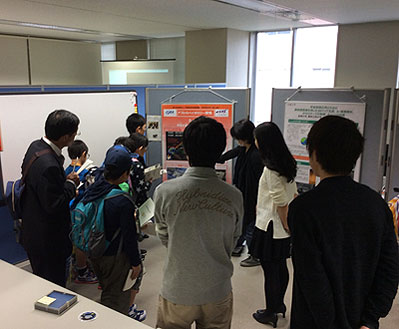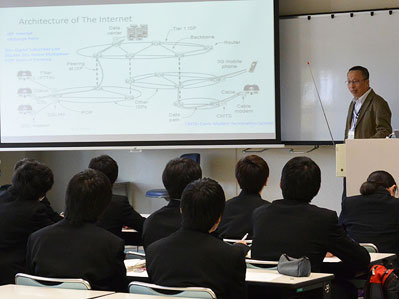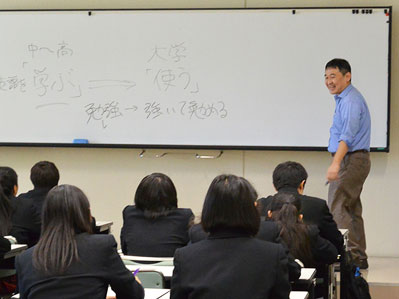In October 2016, four student groups from elementary school to senior high school in Aizuwakamatsu City visited the UoA.
Saturday, October 8, 2016 Members of the Aizuwakamatsu City Boys and Girls Invention Club (4th to 6th grade) participated in the Open Labs, which was held simultaneously with the UoA Sosho-sai (*1). The elementary school students toured the robotics, drone, and space exploration laboratories, Geek Dojo, and LICTiA. They enjoyed posing questions to UoA students, trying out the interactive exhibits, and more.
Tuesday, October 11, 2016, first-year students from, Aizu Gakuho Junior High School visited labs of CAIST/ARC-Space (*2) The high school students visited corners on the ARC-Space projects such as "Software for lunar and planetary exploration data (*3), "Scientific analysis of remote sensing data for lunar and planetary explorations, Earth observations" (*4), and "Orbital Astrobiology Project "'TANPOPO'" on International Space Station" (*5). UoA students involved in the Hayabusa2 and TANPOPO missions gave explanations to the students. The high school students also had a chance to try out the software used in the projects.
Saturday, October 15, 2016] 1st-year students from Aizu Senior High School attended trial lectures as part of the annual "University of Aizu Seminar". This seminar is organized jointly by the UoA and Aizu Senior High School each fall in order to provide local junior and senior high school students an opportunity to experience learning at a university. This year, ten lecturers were invited from Tsukuba University, Iwaki Meisei University, Fukushima University, Niigata University, and Fukushima Medical University. Two UoA faculty members also participated in this event.
Saturday, October 29, 2016 2nd year students from, Aizu Senior High School trial lesson entitled "Knowing about the World of Research" which was offered in the same style of courses for UoA students.



- *1 News: School Festival Sosho Sai 2016 Held
- *2 CAIST/ARC-Space
- *3 Software for Lunar and planetary exploration data analysis
- *4 Scientific analysis of remote sensing data for lunar and planetary explorations, Earth observations
- *5 Orbital astrobiology project "TANPOPO" on International Space Station


